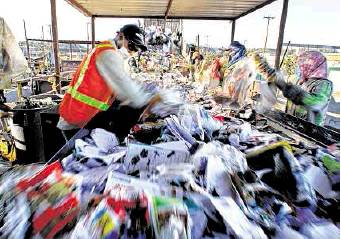In war against plastic, the energy industry should beware
CHRIS TOMLINSON Commentary
The war against plastic is on.
China’s government is introducing bans on single-use straws, utensils and a slew of other disposable products in the world’s most populous country. After standing by as water supplies and the ocean filled with tiny shards of polyethylene, the government is cracking down.
The anticipated drop in plastic consumption, accompanied by new research to improve recycling, is bad news for Texas natural gas producers. Their product is the key ingredient in this environmental menace, which is known within the industry as polymers.
“China is the biggest polymer import market in the world, especially for polyethylene, around half of the demand for which is in single-use plastics,” explained John Richardson, senior consultant for Asia at ICIS, a commodity market intelligence company. “So, whatever happens in China is a big deal for the global polymer business.”
China’s National Development and Reform Commission has released a three-stage plan to prohibit the production and sale of ultra-thin plastic bags, foam tableware, disposable plastic swabs, and the production of goods containing plastic micro-beads.
By 2025, the government will ban shipping services from using disposable plastic packaging while restricting the amount of plastic tape they use.
“The implications both for virgin PE (polyethylene) polymers demand in China and for the amount of that demand which is met by recycled production are likely to be very significant,” Richardson added.
U.S. polyethylene exports to China are expected to rise this year, before the bans become effective, but producers already see prices drop due to a global glut created by overproduction of U.S. natural gas, Richardson wrote in a separate report.
Producers don’t need to worry about a U.S. ban. In Texas, state lawmakers have rolled back municipal regulations limited single-use plastic products. But consumers are demanding change.
Unilever, a conglomerate that makes thousands of consumer goods, has pledged to reduce plastic packaging by 110,000 tons by 2025, a15 percent cut. The corporation also will work toward 100 percent recycled, reusable or compostable packing.
“Our plastic is our responsibility, and so we are committed to collecting back more than we sell, as part of our drive towards a circular economy,” CEO Alan Jope said, promising to eventually collect 600,000 tons of plastic waste a year.
Every major corporation, especially consumer brands, is searching for ways to appease customers worried about putting more plastic into the environment.
Starbucks has announced plans to shift to reusable packaging, research how to change customer behavior and cut packaging waste 50 percent by 2030.
“Our aspiration is to become resource positive — storing more carbon than we emit, eliminating waste, and providing more clean freshwater than we use,” Starbucks CEO Kevin Johnson said in a statement. “We do know that this journey will require new innovations and creative ideas from entrepreneurs, nonprofits, our suppliers, our licensees, our partners and our customers.”
Innovations in recycling will be the most critical. The biggest problems are convincing people to recycle plastic and then figuring out how to process it.
Some types of plastic, classes 1 through 4, can be recycled by shredding, cleaning and melting them, but the process is dirty and wasteful. More exotic plastics, such as foam packing peanuts, cannot be recycled at all.
“The issues with current recycling processes are so severe that countries who were previously mass importers of waste for recycling have closed their doors, leading to significant buildup of polymer waste,” Bryony Core writes in a research paper for IDTechEx, a market research company.
New research is focused on using chemical processes to break down plastic waste into its chemical components, which can become feedstocks for new plastics or fuels.
If implemented on a commercial scale, recycling plastic will become as easy as recycling aluminum cans, which today include 70 percent recycled content.
The implications for the environment and the petrochemical industry is significant. People around the world dump the equivalent of one garbage truck full of plastic into our waterways every minute.
Experts hope that once economical recycling processes are available, companies create buyback programs that pay enough to make recycling profitable. This is bad news for the oil and gas industry, which is banking on petrochemical demand growing as gasoline and diesel demand recedes.
Anyone who thinks they can accurately forecast consumer behavior or technological innovation is a fool. But one thing is clear; the petrochemical industry will be drastically different than it is today, the supply chain should pay attention.
Tomlinson writes commentary about business, economics and policy. twitter.com/cltomlinsonchris.tomlinson@chron.com


